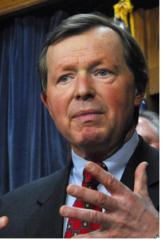
But Pomeroy was defeated for re-election in the Republican sweep last November, and now, as a member of the health care group at the law firm of Alston & Bird, he discussed the future of pension legislation with Fran Hawthorne of Institutional Investor.
Institutional Investor: You were one of the few members of Congress who was actually interested in pension issues. Who’s left now to pick up the ball?
Pomeroy: On the Senate side I’m very hopeful about the reuniting of [Ohio Republican Rob] Portman and [Maryland Democrat Benjamin] Cardin. They were quite a pension powerhouse, bipartisan team in the House. [The two men served together in the House from 1993-2005 and were best-known for co-sponsoring bills to raise the contribution limits on 401(k) plans, Cardin was elected to the Senate in 2006 and Portman in November.] And [Pennsylvania Democratic Senator] Bob Casey displayed a lot of interest from his subcommittee [on retirement and aging] position. He was quite helpful as we tried to get some short-term funding relief from the Pension Protection Act.
On the House side, I was very pleased to work with [Ohio Republican] Pat Tiberi on Ways and Means. I think that he will probably play the role that Rob Portman used to play. [Wisconsin Democrat] Ron Kind has expressed in getting more involved. His approach would be quite similar to me, a common-sense, pragmatic way to protect retirement savings.
Congress has so much on its plate. Will there be any time to deal with pension issues?
Basically what tends to drive pension activity in Congress is crisis, or a broader tax bill that might offer a vehicle to carry into place pension reform policy. The short-term funding crisis has been addressed. I don’t see a broader overhaul of pensions generally
So are there any pensions matters Congress might take on?
The most significant point of discussion is probably going to be public pension plans.
Will Congress step in and help out the states?
I don’t see a bailout bill or something like that. The dangers have been generally overstated. There are a few troubled plans, but mostly they are what you would expect to see, given the market volatility of late.
But won’t there be pressure on Congress to do something, with all the headlines?
There’s some movement for greater transparency. [Representatives Devin Nunes, D-CA; Paul Ryan, R-WI; and Darrell Issa, R-CA, introduced the Public Employee Pension Transparency Act in December.] I like the idea of transparency, but the problem I had with the Nunes bill is that it was requiring a formula that was a dramatic departure from the standard that is a well established approach on accounting. The Nunes bill takes a very tough mark-to-market approach.
The other big retirement issue is Social Security. What do you think Congress will do about that?
I don’t expect much with Social Security in this political environment. There’s not an imminent crisis.
Many people in the industry would like Washington to allow annuity-like products as the default option in automatic enrollment.
There could be some relief on the fiduciary standards that could expand annuitization opportunities within 401k plans. It’s difficult to predict this particular Congress.
After seeing what the market collapse did to people’s 401(k) balances, have attitudes in Congress changed toward defined contributions?
I think both parties would agree that the 401(k) stand-alone savings approach is falling short of providing income security for retirees. That realization is getting more clear every year among members of Congress. Whether we’ve reached a tipping point where they can move forward to do something about it, I don’t know.
You could help tip it! Do you plan to run again for your old congressional seat, or for the North Dakota Senate seat that will open up? [Democrat Kent Conrad has announced he will not run for re-election in 2012.]
Being in Congress was the adventure of a lifetime. There will never be an experience I have that’s quite the same as being in a room, at the table, participating in the shaping of public policy in a most direct way. And yet after 18 years I do have a sense of closure about that. I’m done running for office.
Why did you become so interested in pensions?
I’m a pension nerd. I find it endlessly interesting, and of course it’s so important to people
Fran Hawthorne is the author of the award-winning “Pension Dumping: The Reasons, the Wreckage, the Stakes for Wall Street” (Bloomberg Press) and “Inside the FDA: The Business and Politics behind the Drugs We Take and the Food We Eat” (John Wiley & Sons). She writes regularly about finance, health care, and business ethics.






